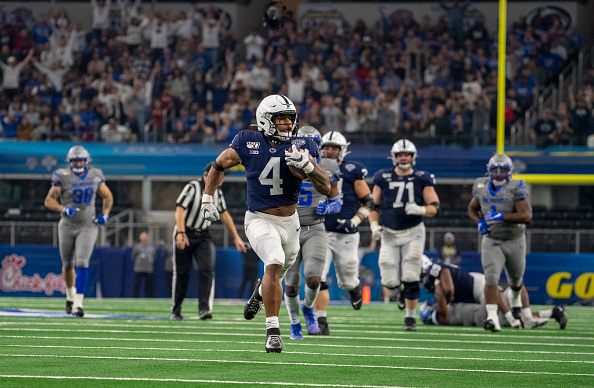On Wednesday afternoon, Penn State head coach James Franklin announced that redshirt running back Journey Brown was medically retiring from football. He had been held out of the season in October while he went through further evaluations of a medical condition identified in the offseason. The medical condition he was diagnosed with was hypertrophic cardiomyopathy.
The name itself is a mouthful and while Brown should be able to live his life with minimal problems, competition at an elite level is no longer in the cards. In this article, I will try to explain the condition without making readers feel as if they are sitting in a medical school lecture.
What is it?
Hypertrophic cardiomyopathy (HCM) is a genetic disease that causes the heart muscle to become thickened, or hypertrophied. The heart cells in HCM are also abnormal, arranged in a disorganized pattern with fibrotic tissue often found between the heart cells. The prevalence of HCM in the general population is about 1 in 500. However, most of these cases remain undiagnosed because the person has no problems that would lead to the investigation and diagnosis. Most patients with HCM are asymptomatic and are not at risk of developing adverse complications related to HCM.
How do you get it?
HCM is caused by a mutation in the genetic code resulting in the body developing the cells in the heart in a defective way. It is an autosomal dominant gene which means a person with the gene will either develop the disease fully or be an asymptomatic carrier. It takes a copy of the gene from both parents for a person to develop the disease.
Men and women are equally likely to inherit HCM. If a child does inherit the mutation, the patient will start to develop abnormal heart cells during puberty. The severity of heart disease that will develop cannot be accurately predicted. In addition, the thickness of the muscle that patients have at the end of adolescence is usually the thickness that they will have for the rest of their life. It is these unknowns that make football a high-risk activity for Brown going forward.
Symptoms associated HCM
The age when symptoms develop and the severity of symptoms vary significantly from patient to patient. Some patients never have symptoms and may never know that they have the condition at all. The most common symptoms include:
- Shortness of breath (dyspnea) on exertion,
- Chest pain at rest or with exertion
- Fainting (syncope) and near-fainting (presyncope)
- Palpitations which is an awareness of the heartbeat or feeling a “forceful” heartbeat
- Lightheadedness when changing position
- Exertional fatigue or lack of energy
- Swelling of the legs and feet (edema)
Patients without symptoms or only mild symptoms have a better long-term outlook than persons with more significant symptoms.
How is it Diagnosed and Treated
In a patient with whom a physician has a suspicion of HCM, a series of tests can be ordered to evaluate the person’s cardiac status. These include EKG, echocardiogram (ultrasound of the heart), exercise stress test, MRI of heart, and a genetic investigation of first degree relatives for related issues.
Once the condition has been diagnosed treatment is designed based on what symptoms are present. This maximizes the quality of life while trying to prevent sudden cardiac death. Patients are advised to avoid dehydration or high-intensity exertion. With care and attention to the instructions of their physician, a patient can live a full life with appropriate care.
The staff of Prime Time Sports Talk wish Brown a long uneventful life going forward. Our thought and prayers are with him and his family.
Check us out on our socials:
Twitter: @PTSTNews and @TalkPrimeTime
Facebook Page: Prime Time Sports Talk
Join our Facebook Group: Prime Time Sports Talk
Instagram: @ptsportstalk
Follow Beth Sullivan on Twitter @GAPeachPolymer
Main Image Credit: Embed from Getty Images







